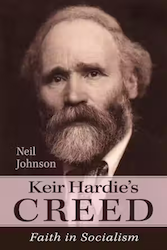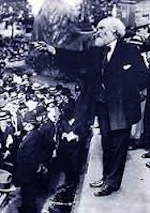A new book on the ILP’s founder and first leader explores the religious underpinnings of his socialist faith. It contains important lessons for the left today, says CHRIS WILSON.
Methodist minister Reverend Neil Johnson offers a valuable contribution to the historiography of Keir Hardie in this fascinating booklet. While many have written about Hardie’s life and politics, here focus is trained on the Christian underpinning of his developing activism.
 Keir Hardie’s Creed deserves consideration by all those interested in the formative years of the British Labour movement or in the development of Hardie’s political thinking. Johnson draws an interesting distinction between Christian socialist and socialist Christian thought, placing early pioneers such as FD Maurice in the former camp, as one whose ecclesiastical position and theological reflection led to socialist advocacy; and Hardie in the latter, drawing inspiration more from the person of Jesus than from some doctrinal system.
Keir Hardie’s Creed deserves consideration by all those interested in the formative years of the British Labour movement or in the development of Hardie’s political thinking. Johnson draws an interesting distinction between Christian socialist and socialist Christian thought, placing early pioneers such as FD Maurice in the former camp, as one whose ecclesiastical position and theological reflection led to socialist advocacy; and Hardie in the latter, drawing inspiration more from the person of Jesus than from some doctrinal system.
He has a point. Christ’s life certainly resonated with Hardie’s own. Johnson points to Caroline Benn’s observation that Christ and Hardie were both born to unmarried parents, had fathers who were carpenters and mothers called Mary. No wonder then that Hardie saw in Christ’s life some expression of his own.
Hardie’s Christianity was certainly of the dissenting variety, with strong congregational influences, and shaped by the emerging Labour Churches. For Hardie, Jesus became the working man of his time, excluded and marginalised yet expressing in and through his life the struggle for brotherhood and peace, where the ends never justified the means (Christ rejected the Zealots of his day), and with his disciples holding all things in common.
Here then is an embryonic, deeply ethical and democratic socialism.
Johnson also offers a valuable summary of those other influences on Hardie’s life, from John Ruskin to Robert Burns to Thomas Carlyle to John Stuart Mill. This I found convincing, although I am less sure about the impact of Walt Whitman or Ralph Waldo Emerson as that risks recasting Hardie as a Unitarian Christian, deeply devoted to the person of Christ but not accepting his privileged position as saviour of humanity. This might have been true of Ramsay McDonald but Hardie’s later wish to have preached the gospel suggests otherwise in his case.
On the other hand, Johnson is surely right to see Hardie’s embrace of socialism in religious terms. The argument that his socialism was no more than the religion of Jesus (as opposed to religion about Jesus) recast as political activism in his own time is compelling. Hardie’s creed was neither scientific socialism nor utopian socialism but something else, something more like a religious revival based on a political outworking of Hardie’s personal commitment to Christ.
Gospel of Labour
I also liked the author’s attempt to summarise Hardie’s creed: “Socialism is the Christianity of today … the gospel of the whole labour movement … based on love, fraternity and service.”
 There is much here that needs to be rediscovered today – the idea that we should be changing capitalism not accommodating it, and that change must not just be a revolution of structures but also of the heart. Hardie’s socialism was never of the Leninist insurrectionist variety, notwithstanding his nod to Marx in his book From Serfdom to Socialism.
There is much here that needs to be rediscovered today – the idea that we should be changing capitalism not accommodating it, and that change must not just be a revolution of structures but also of the heart. Hardie’s socialism was never of the Leninist insurrectionist variety, notwithstanding his nod to Marx in his book From Serfdom to Socialism.
Johnson also explores Hardie’s commitment to temperance, and this deserves further unpacking – that his politics was also shaped by the wider fraternities to which he belonged. There was the miners’ union, of course, but also the temperance of the Independent Order of Good Templars (still going today, and still pointing out the damage of alcohol to people and societies).
Hardie remains a deeply compelling figure. Johnson has reminded us that he cannot be simplistically located even within the (or should that be ‘a’?) Christian tradition, but rather is someone who stands apart, a dissenter amongst dissenters, a prophet standing alone. There is indeed, something of the Old Testament prophet in Hardie – speaking truth to power, seeking the common good, praised then vilified in his own lifetime.
What then can we learn from this book and from Hardie?
That socialism has to be visionary, certainly; ethical too, with deeps roots in the culture of the day; and fed in Hardie’s case from the ecosystem of radical dissent, trade unionism, friendly societies, temperance causes and a growing working class confidence. We learn that hearts as well as minds, behaviours as well as structures need to change if the New Jerusalem, or the Kingdom of God, or the socialist utopia is ever to arrive.
But there’s also a strong warning against naivety. Hardie’s pacifism was swept away by the blood of the trenches and its relevance today is questionable when confronted with our current world and its authoritarian leaders.
Still, when facing a world of injustice, inspiration can still be drawn from Keir Hardie’s creed, just as, in turn, the great man drew inspiration from that radical Galilean peasant, Jesus Christ. As Johnson notes, in the words of James Keir Hardie himself, “Socialism is a sacred cause.” And Christ’s ‘Sermon on the Mount’ from Matthew 5 is a pretty good place to start.
—-
The Reverend Chris Wilson serves on the national executive committees of the Community Union and the Co-operative Party. He is a church minister and member of Christians on the Left. He writes in a personal capacity.
Keir Hardie’s Creed: Faith in Socialism by Neil Johnson is published by Wipf and Stock, and available here for £27 (hardback) or £16 (paperback).
See also: ‘Hardie’s Creed & the Religion of Socialism’ by Neil Johnson.
And: ‘Christian Socialism: Out There & Active’ by Chris Wilson.


